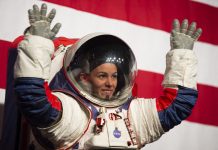Gaganyaan – India’s 1st Space Manned Mission is gearing up fast. Indian PM during his independence day address stated that an astronaut will go on a space odyssey by 2022 on project ‘Gaganyaan’. Astronauts who will eventually be part of the proposed human spaceflight programme (Gaganyaan) will have a tough time in space and preparing them for the travel will be a challenge for the Institute of Aerospace Medicine (IAM).
- Chandrayaan-2 Mission Launch Date Delayed to January 2019
- How Pakistan’s Space Agency SUPARCO beat ISRO in Space Race?
Gaganyaan: Human Spaceflight Programme
Gaganyaan is an Indian Human Spaceflight Programme designed to carry three people, and a planned upgraded version will be equipped with rendezvous and docking capability. In its maiden crewed mission, Indian Space Research Organisation’s 3.7-tonne capsule will orbit the Earth at 400 km altitude for up to seven days with a three-person crew on board. The crewed vehicle is planned to be launched on ISRO’s GSLV Mk III in 2022
Determined to assist the Indian Space Research Organisation (ISRO) send humans into space, IAF commandant Air Commodore Anupam Agarwal said, “Every aspect of an astronaut’s life is unique. We’ll require about 12-14 months to select the astronauts for project Gaghanyaan and once selected they will be fit for at least 10 years.
He said that staying in the space capsule can lead to isolation issues that will augment even small things (like his co-astronaut picking his nose) can lead to problems.
“Therefore, it is vital that there isn’t even the smallest of physiological imbalance that could potentially lead to awkward actions. So, every small issue must be taken care of and we are confident that we will be able to do that,” he said.
From culture to individual preferences, everything will be taken into account while selecting the astronauts, he said, adding that the process will be complicated as no country will share this know-how with India.
“Also, we will be the first country to send humans as part of the first mission. All other countries tested their systems by sending animals that brought back some learning,” Agarwal said. “But we’ll shoulder this responsibility and we will not fail the nation,” he said.
“Institute of Aerospace Medicine will be closely associated in the Gaganyaan manned mission as far as astronaut selection, training, development of crew module and air quality monitoring et al. We’ll be part of the mission from pre-launch to recovery stage,” he said.




